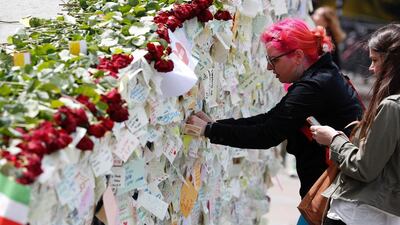Three years after the fall of Mosul, ISIL is a global political force. "Political" because the ideas and ideology of ISIL have infected so many countries, so deeply, that they have moved beyond being a mere terror group. What they are seeking to do has such vast consequences that governments across the world are forced to wrestle with the economic, security and community implications of the group.
Last week, in these pages, I wrote about ISIL's strategy of the "grey zone".
In the Middle East, ISIL preyed on sectarian tensions and unstable countries. By attacking Shia communities, ISIL provoked a backlash against Sunni communities, allowing the group to pose as protectors of the Sunnis.
It is using the very same strategy in Europe. By attacking European cities, the group seeks the same backlash against Muslim communities, in the hope that Muslims in the West will be forced to choose: either stay and face draconian measures of surveillance or worse (internment being a policy mooted in the UK after the latest attacks), or leave and join ISIL.
This is the "grey zone" strategy, eliminating the grey area where most people live, forcing them to choose one side or another.
Could such a strategy work? Only the most pessimistic would say yes. But only the most optimistic would say definitely not. The fact is that the strategy has worked in the Middle East. And it might yet work in Europe.
ISIL is an example of a political storm; an event that blows in and damages or destroys those parts that were already weak. In the Middle East, years of bad governance, sectarianism and war created conditions for ISIL to thrive. The storm came in and blew away fragile and damaged institutions.
Yet the Middle East has also had centuries of experience of intercommunal living. For most of the time that there have been Islamic societies, there has been no better place to be Jewish or a minority Christian community than under Muslim protection. For centuries, as pogroms and discrimination were rife in Europe, Jewish communities in Islamic lands were safe.
The same was true of other minority faiths and sects: Yazidis, Druze, and the large Shia communities and their offshoots; all found a broadly secure home under Muslim rule. Yet look how quickly that collapsed. In Iraq, for decades, Sunnis and Shia, Muslims and Christians, lived side by side and intermarried.
It wasn't a utopia, but it was a working, thriving pluralistic society.
And yet so powerful was ISIL's strategy of pitting one sect against the other, one faith against the other, that those years of interfaith living, where neighbours could not tell who was Christian and who was Muslim, where there were Shia and Sunni members of the same family, came to an abrupt and bloody end.
It wasn't that Iraqi society proved fragile. It was that after years of war, Iraq was a precarious society. And when the bombs started and people did not know friend from foe, the old bonds of sect and faith proved so appealing.
If that was the case with the Middle East, with centuries of communality, might it also be the case with Europe, which has less experience of large minority communities in its midst and – frankly – a rather unglorious history of turning on its own minorities?
Because Europe, too, is becoming precarious. The fallout from the economic crash of 2008 still lingers.
There are large parts of Britain, France and Belgium that are deprived – and it is in some of these areas that Muslims live alongside non-Muslim citizens. There remain vast economic inequalities, and the rewards of mass immigration have not been evenly distributed. In some places, community cohesion is fragile.
Already, ISIL are testing the bonds of community with their grey zone strategy. What happens when the group decides that bars and music concerts aren't sufficiently soft targets?
What happens when they go after Christian worshippers in church, or children in schools – all acts they have already committed around the world? Will Europe prove strong enough to weather that shock? Will politicians be able to face down the protests?
These are frightening questions and I understand why few in Europe ask them. Because the truth is, no one really knows until the worst happens. But there are reasons for optimism.
Al Qaeda had a strategy of seeking to separate the public from their government. ISIL's terror seeks to split European communities from each other. In the Middle East, the second proved much deadlier.
What will save Europe is the same thing that saved some Middle Eastern countries: the rule of law and sober politics. It was failed institutions, a collapse in the rule of law and the politicisation of religion that allowed ISIL to find a foothold in Syria and Iraq. But other regional countries, such as Turkey, have proved stronger.
As long as those countries that are being targeted by ISIL, in Europe and in the Arab world, can keep their foundations strong, they will be able to weather the political storm of ISIL.
falyafai@thenational.ae
On Twitter: @FaisalAlYafai


